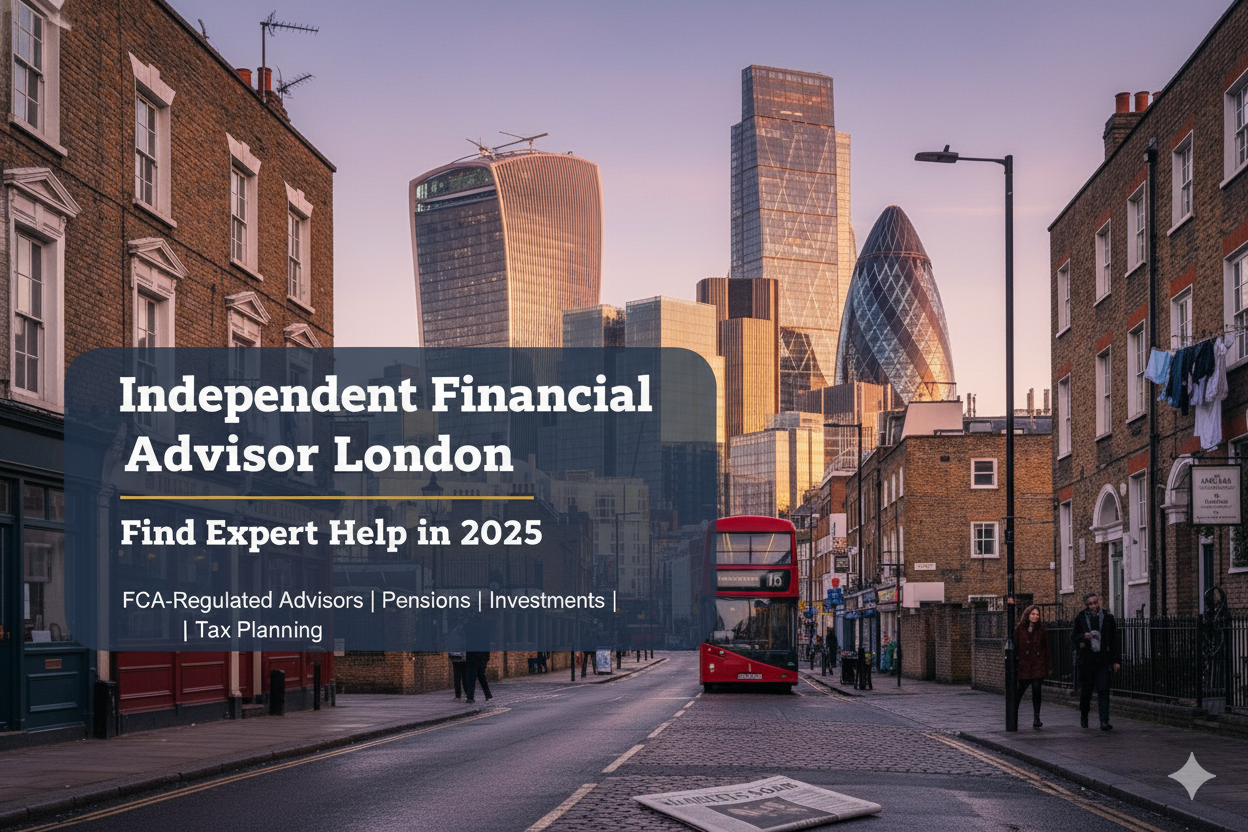
Look, I’ll be honest with you. I spent three hours last Tuesday night trying to figure out whether my pension contributions were actually doing anything useful, or if I was just throwing money into a void whilst crossing my fingers. Spoiler alert: spreadsheets don’t answer existential questions about your financial future, no matter how many colour-coded tabs you create.
Here’s the thing about money in London – it moves differently here. Your rent alone probably costs what some people spend on an entire lifestyle elsewhere. You’re juggling student loans, maybe a mortgage if you’re lucky (or mad enough to have bought in), and somehow you’re supposed to be planning for retirement whilst also, you know, living. It’s exhausting.
This is precisely why more Londoners are seeking out an independent financial advisor in London – not because they’re wealthy (though some are), but because they’re tired of making financial decisions based on what their mate Dave reckons, or whatever they half-remember from that money podcast they fell asleep listening to.
The Independent Bit Actually Matters (And Here’s Why)
When I first heard the term “independent financial advisor,” I thought it was just marketing speak. Turns out, it’s legally meaningful. An independent advisor can recommend products from across the entire market, rather than being tied to specific companies or products. It’s the difference between shopping at a department store versus being trapped in a single brand’s shop where everything mysteriously looks perfect for you (according to the salesperson who works there).
The alternative? Restricted advisors who can only recommend certain products. They might be brilliant at what they do, but they’re working with a limited toolkit. And your finances? They’re complicated enough without artificial constraints.
Most people don’t realise this distinction exists until they’re already sitting in a meeting, nodding along whilst internally panicking about whether they’re getting the full picture. An independent financial advisor in London operates under different rules – they’re obligated to search the whole market, not just their favourite corner of it.
What Actually Happens When You Hire One
Right, so you’ve decided your financial life needs professional intervention. What now?
First meeting usually involves them asking uncomfortable questions about your spending habits. (Yes, those Saturday bottomless brunches do add up. No, I don’t want to talk about it.) But here’s what surprised me: good advisors don’t just lecture you about avocado toast and lattes. They actually want to understand what you’re trying to achieve with your money.
The typical process looks something like this:
- Initial consultation where you lay out your financial situation (yes, all of it)
- They analyse everything – your income, debts, assets, that weird investment your uncle convinced you to make
- Research phase where they dig through market options
- Recommendations presented with actual explanations, not jargon
- Implementation of the strategy
- Regular reviews because your life will inevitably change
For companies like Ask Accountant, based at 178 Merton High St, this comprehensive approach extends beyond just investment advice. They weave together inheritance tax planning, business advice, CIS claims and refunds, and proactive tax advisory solutions – particularly useful if you’re self-employed or running your own venture in London’s chaotic business ecosystem.

The Cost Question Nobody Wants to Ask
Let’s address the elephant in the room: how much does this actually cost?
Financial advisors in the UK typically charge in one of three ways:
Fee Structure Breakdown:
| Fee Type | How It Works | Typical Range | Best For |
| Fixed Fee | One-off charge for specific advice | £500 – £3,000+ | Single issues like pension review or inheritance planning |
| Percentage of Assets | Annual fee based on assets under management | 0.5% – 2% per year | Ongoing investment management |
| Hourly Rate | Pay for time spent | £150 – £350/hour | Quick consultations, specific questions |
| Retainer/Subscription | Regular monthly or annual fee | £100-500/month | Ongoing relationship & regular check-ins |
I know what you’re thinking: “That seems expensive.” And yes, it can be. But here’s the uncomfortable truth – making the wrong financial decision because you didn’t understand the options can cost you significantly more than an advisor’s fee. Missing out on tax reliefs? Expensive. Picking the wrong pension fund that underperforms for 20 years? Extraordinarily expensive.
When You Actually Need Professional Help (Versus When YouTube Will Suffice)
Not every financial question requires professional intervention. Working out how to set up a standing order? YouTube tutorial territory. Deciding whether to take your pension as a lump sum or annuity? Get professional help, for the love of your future self.
You probably need an independent financial advisor in London if:
- You’ve just received a windfall (inheritance, bonus, lottery win, sold a business) and have no idea what to do with it. Suddenly having money doesn’t mean you suddenly know how to handle it. I’ve seen people receive six-figure sums and panic-buy property in terrible locations because they didn’t know what else to do.
- Your business is growing and your financial situation has become genuinely complicated. When you’re juggling business advisory needs, CIS claims and refunds, auto-enrolment obligations for staff, and trying to plan for growth whilst keeping HMRC happy – that’s when places like Ask Accountant become invaluable. Ring them on +44(0)20 8543 1991 before you make decisions that can’t be easily unmade.
- You’re approaching retirement. This isn’t the time to wing it based on what you read in a newspaper supplement. The rules around pensions are Byzantine, and the decisions you make now will affect your quality of life for potentially 30+ years.
- You need inheritance tax planning. If your estate might exceed the threshold (and in London, with property prices being what they are, this affects more people than you’d think), professional advice isn’t optional – it’s essential.
The London Factor: Why Location Actually Matters
Here’s something I didn’t appreciate until recently: financial advice needs to be contextual. An advisor based in rural Yorkshire might be excellent, but they’re not navigating the same financial landscape you are as a Londoner.
London-specific considerations include:
- Property madness. The capital’s housing market operates in its own special dimension of chaos. An independent financial advisor in London understands the deposit requirements, Help to Buy schemes, shared ownership complexities, and the soul-crushing reality of trying to get on the property ladder here.
- Career volatility. London careers often involve more movement, contract work, freelancing, side hustles. Traditional financial advice built around “steady job for 40 years” doesn’t quite fit. You need someone who gets that your income might look more like a graph of a seismograph than a nice steady line.
- Higher cost of living, higher earning potential. The numbers are just different here. What constitutes a “good salary” or “healthy savings” in London wouldn’t make sense elsewhere in the UK. Your advisor needs to understand this without clutching their pearls every time you mention rent figures.

The Regulation Situation (Boring But Crucial)
Financial advisors in the UK must be authorised by the Financial Conduct Authority (FCA). This isn’t just bureaucratic box-ticking – it means they’re bound by actual rules with actual consequences if they mess up.
You can check if an advisor is properly registered on the FCA register. Takes about 30 seconds. If someone’s offering financial advice and they’re not on there? Run. Don’t walk, run.
The FCA also requires advisors to have Professional Indemnity Insurance. This protects you if they give you advice that turns out to be catastrophically wrong. It’s the financial equivalent of knowing your surgeon has malpractice insurance – you hope you’ll never need it, but it’s reassuring that it exists.
What Independent Advisors Can Actually Help With
The scope is broader than most people realise. Yes, investments and pensions are the obvious ones, but an independent financial advisor in London typically helps with:
- Retirement planning – not just picking a pension, but figuring out how much you need, where it should go, how to maximise tax relief, and whether you’re on track or need to panic.
- Investment strategy – ISAs, stocks, bonds, funds, and whatever new financial product has been invented this week. They help you build a portfolio that matches your risk tolerance (which might be different from what you think your risk tolerance is).
- Protection – life insurance, income protection, critical illness cover. Nobody wants to think about this stuff, but ignoring it doesn’t make bad things less likely to happen.
- Mortgage advice – finding the right mortgage when you’re self-employed, or your income is complicated, or you want to remortgage, or literally any of the thousand permutations of “I need to borrow a life-changing amount of money.”
- Tax planning – legal ways to reduce your tax bill through pensions, ISAs, and other structures. This overlaps significantly with tax advisory solutions – the difference between reactive (dealing with tax after the fact) and proactive (structuring things cleverly from the start) can be substantial.
For business owners, this extends into business accounting services, bookkeeping, small business accounting services, and business growth planning. Ask Accountant specialises in this intersection – where personal financial planning meets business strategy.
The Questions You Should Actually Ask
When you’re interviewing potential advisors (yes, interview them – they work for you), here are the questions that matter:
- “Are you independent?” Seems obvious, but confirm it explicitly.
- “How do you charge, and what’s included?” Get specifics. Does “financial planning” include one meeting or ongoing support? What triggers additional fees?
- “What qualifications do you hold?” Look for Chartered Financial Planner or Certified Financial Planner designations. These require serious study and ongoing professional development.
- “Can I see an example of a financial plan you’ve created?” This shows you their thinking process and whether they communicate clearly or hide behind jargon.
- “How often will we review my situation?” Financial planning isn’t a one-and-done activity. Your life changes, markets change, regulations change.
- “What happens if you’re unavailable?” If they’re a solo practitioner, what’s the backup plan?
The Uncomfortable Bits They Don’t Advertise
Financial advisors can be brilliant, but they’re not magicians. They can’t make your money grow faster than the market allows (anyone promising guaranteed high returns is either lying or running a scheme). They can’t eliminate risk entirely – they can only help you manage it intelligently.
Also? You’ll need to be honest with them. Hiding debts or gambling habits or whatever financial skeletons you’ve got rattling around won’t help anyone. It’s like lying to your doctor about symptoms – you’re only sabotaging yourself.
Some advisors have minimum asset requirements. If you’re just starting out, not every advisor will take you on. It’s frustrating, but it’s the reality of the economics of advice. However, there are advisors and firms that specifically work with younger clients or those earlier in their wealth-building journey.
Alternative Routes (If You’re Not Ready for Full Advice)
Maybe you’re not quite at the “hire a full financial advisor” stage. Fair enough. Middle ground options include:
- Robo-advisors – algorithm-driven investment platforms that are cheaper than human advisors. They work well for straightforward situations but lack the nuance of human advice.
- Guidance services – the government’s Pension Wise service offers free guidance (not advice – there’s a legal distinction) for those over 50.
- One-off consultations – many advisors, including those specialising as an independent financial advisor in London, offer single-session consultations where you can ask specific questions without committing to an ongoing relationship.
- Financial coaches – focus more on behaviour and budgeting than investment strategy. Less regulated, but can be helpful for getting your financial house in order.
Red Flags to Watch For
Not every advisor is created equal. Warning signs include:
- Pressure to make immediate decisions. Good advisors give you time to think.
- Recommendations that seem to primarily benefit them through high commissions. (This is less common with independent advisors, but still possible.)
- Reluctance to explain things clearly. If you don’t understand their recommendations after they’ve explained them, that’s a them problem, not a you problem.
- Promises of guaranteed returns or “risk-free” investments. These don’t exist.
- Lack of proper documentation or FCA authorisation.
Making the Decision: Is It Worth It?
Here’s my honest take: if your financial situation is straightforward (single income source, simple tax situation, basic savings goals), you might not need an independent financial advisor in London right now. But if any of the following are true, the investment in advice probably makes sense:
- You have complex income (self-employment, multiple sources, investments generating income)
- You’re approaching major life transitions (retirement, inheritance, business sale)
- You have substantial assets that need proper management
- You’re constantly worried about whether you’re making the right money decisions
- You’ve made financial mistakes in the past and want to avoid repeating them
The value isn’t just in the specific recommendations – it’s in the peace of mind that comes from having a proper plan. Not worrying about whether you’ve forgotten something crucial or made a terrible decision out of ignorance.
Practical Steps to Get Started
Right. You’ve decided you want to find an advisor. Here’s how:
- Step one: Get clear on what you actually need help with. Vague “help me with money” isn’t specific enough. Is it retirement planning? Investment strategy? Tax efficiency? Business growth?
- Step two: Search for FCA-authorised advisors in your area. The Personal Finance Society, Vouched For, and Unbiased are all legitimate directories.
- Step three: Shortlist 3-4 advisors and request initial consultations. Most offer these for free or a nominal fee.
- Step four: Come prepared with questions and basic information about your financial situation. You don’t need to have everything perfectly organised, but bring what you can.
- Step five: Trust your gut. Credentials matter, but so does whether you actually feel comfortable discussing your finances with this person.
For comprehensive services that span accounting and bookkeeping, tax advisory solutions, and broader financial planning, contacting an integrated firm like Ask Accountant at 178 Merton High St can streamline things considerably.
The Following Years: What an Ongoing Relationship Looks Like
If you establish an ongoing relationship with an independent financial advisor in London, here’s what typically happens:
- Regular review meetings (quarterly, semi-annually, or annually depending on your arrangement). These aren’t just box-ticking exercises – they’re opportunities to adjust strategy as your life changes.
- Proactive contact when relevant changes happen (new tax rules, market opportunities, regulatory changes affecting your situation).
- Annual financial plan updates reflecting changes in your circumstances, goals, or the broader economic environment.
- Access to specialist knowledge when needed – maybe you suddenly need to understand inheritance tax implications after an unexpected bequest, or you’re considering CIS claims and refunds for your construction business.
The relationship should evolve. What you need at 35 differs from what you need at 55. A good advisor adapts their service to match.
Specific Scenarios Where Independent Advice Proves Its Worth
Let me paint some pictures:
Scenario A: Sarah, 42, freelance consultant. Income varies wildly month to month. She’s been stuffing money into a regular savings account because she doesn’t know what else to do with it. An independent financial advisor in London helps her set up a proper emergency fund, maximise her pension contributions during high-earning months, and structure her business finances more tax-efficiently. The tax savings alone cover the advice fee within 18 months.
Scenario B: James and Priya, recently inherited £180,000 from James’s aunt. They’re overwhelmed and slightly terrified of making the wrong move. Through inheritance tax and investment planning, they create a strategy that balances their goals: house deposit, investments for their children’s future, and still having some left to enjoy now.
Scenario C: Dev runs a small construction company. He’s drowning in paperwork, constantly stressed about auto-enrolment obligations, confused about CIS claims and refunds, and has no idea if his business is actually profitable or just busy. Integrated business advisory and small business accounting services transform his understanding of the business, freeing him to focus on growth rather than spreadsheet hell.
The Digital Transformation (For Better and Worse)
Financial advice has gone increasingly digital. Video consultations are now standard. Document sharing happens via secure portals. Some advisors rarely meet clients face-to-face anymore.
This has advantages (convenience, accessibility) and disadvantages (harder to build rapport via screen). Some people prefer the traditional in-person meeting; others love the flexibility of digital.
Ask Accountant and similar firms have adapted to offer both options, recognising that different clients have different preferences. The important bit is that the quality of advice shouldn’t depend on the delivery method.
Tax Year Planning: The Annual Scramble
Every year as 5 April approaches, advisors working as an independent financial advisor in London field frantic calls from people who’ve suddenly remembered about ISA allowances, pension contributions, and capital gains tax planning.
Here’s a better approach: start thinking about tax year planning in January or February. This gives you time to:
- Use your full ISA allowance (£20,000 for 2024/25)
- Maximise pension contributions within annual and lifetime allowances
- Realise any capital gains up to the annual exempt amount
- Consider spousal transfers if beneficial
- Review your income distribution if you’re running a business
Proactive tax advisory solutions mean planning these things throughout the year, not scrambling at the last minute. The difference in outcomes can be substantial.
Comparison: DIY vs Professional Advice
| Aspect | DIY Approach | Professional Advisor |
| Cost | Low to free (time investment) | £500 – £5,000+ depending on complexity |
| Time Required | Significant ongoing research & learning | Minimal – mostly meeting attendance |
| Knowledge Depth | Limited by your research ability | Professional expertise & market access |
| Emotional Distance | Hard to be objective about own finances | Third-party perspective helps avoid mistakes |
| Regulatory Protection | None – mistakes are your problem | FCA regulation & PI insurance provide safety net |
| Best For | Simple situations, keen learners, budget constraints | Complex finances, significant assets, busy professionals, approaching retirement |
| Risk Level | Higher (knowledge gaps & emotional decision-making) | Lower (but not zero – bad advisors exist) |

Frequently Asked Questions
Q: What is the amount of money before I hire the independent financial advisor in London?
Technically? Nothing. Practically? Most advisors set minimum asset requirements (usually between 50 and 100,000) since it is not economical to advise on less than a certain amount. There are however advisors who deal with younger or emerging clients. When you are young in the career, but you wish to adopt good habits, you should find advisors who charge you by the hour or by package instead of using assets.
Q: What happens to be the variance between an accountant and a financial advisor?
Investment, pensions, protection and general wealth strategy are the concerns of financial advisors. The accountants deal with financial statements, tax compliance, bookkeeping and business accounting. There is overlap, particularly in the area of tax planning, and this is why integrated firms such as Ask Accountant with both packages can be of particularly great value. You are not provided with siloed recommendations, but holistic advice.
Q: Does a financial consultant promise returns on investments on my investments?
No. Anybody who promises to get certain returns on investment is lying, misinterpreting the regulations, or committing a Ponzi scheme. The financial advisors will assist you in creating the right portfolios and risk management, but they will not be able to control the market returns. Then be much careful of anyone who offers sure high returns.
A: How frequently would you see your financial advisor?
The common practice is to have at least an annual review and some further meetings are evoked by a major life event (change of job, inheritance, marriage, children, homes purchase, etc.). Other clients like quarterly check-outs, especially when they are facing complicated business cases that demand frequent business advice. The frequency must be similar to what you need and how complicated your situation is.
Q: Tax-deductible Financial advice?
It depends. When you are self-employed or have a business, you may take advice on your business finances which is tax-deductible as a business expense. You should not normally deduct personal financial advice. Nevertheless, pension savings are tax-deductible, and some of the plans that an advisor will use will help lower the total amount of your tax bill significantly which is value added in a different key.







